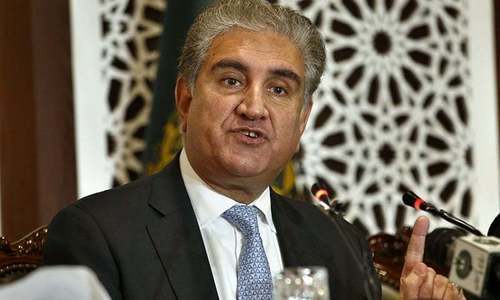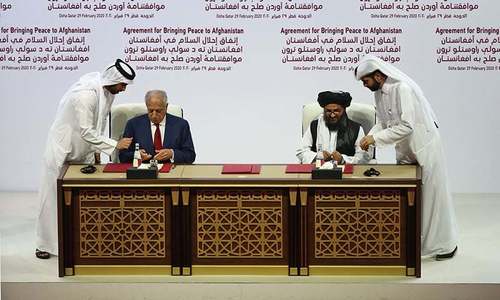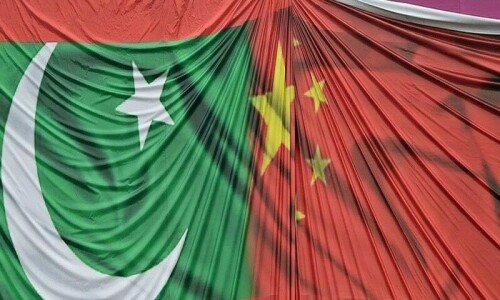KABUL: President Donald Trump spoke by phone to the leader of the Taliban, the militant group and the US leader said on Tuesday, days after Washington signed a historic deal with the militants.
Trump, speaking to reporters at the White House, said he had “a very good talk with the leader of the Taliban”, without naming him.
The 35-minute call came a day after the militants ended a partial truce and threw into doubt peace talks between Kabul and the militants that are due to begin on March 10, according to the US-Taliban agreement signed on Saturday.
A transcript of the phone call released by the Taliban quoted fighter-turned-negotiator Mullah Baradar urging Trump to “take determined actions in regard to the withdrawal of foreign forces from Afghanistan”.
Under the terms of the US-Taliban agreement, foreign forces will quit Afghanistan within 14 months, subject to Taliban security guarantees and a pledge by the insurgents to hold talks with Kabul.
Taliban attack Afghan army bases, throwing peace talks into doubt
But a dispute over a prisoner swap has raised questions about whether the negotiations between Kabul and the Taliban will go ahead.
The agreement includes a commitment to exchange 5,000 Taliban prisoners held by the Afghan government in return for 1,000 captives — something the militants have cited as a prerequisite for talks but which President Ashraf Ghani has refused to do before negotiations start.
Baradar called on Trump to “not allow anyone to take actions that violate the terms of the agreement thus embroiling you even further in this prolonged war”, according to the Taliban transcript.
Apparent differences between the Doha agreement and a joint US-Afghan declaration released in Afghanistan underline the obstacles facing negotiators.
The US-Taliban deal committed to the release of prisoners while the Kabul document only required both sides to determine “the feasibility of releasing” captives.
Since the deal signing, the Taliban have been publicly claiming “victory” over the US.
Taliban attacks
The Taliban carried out dozens of attacks on Afghan army bases, officials said on Tuesday, hours after ending a partial truce and throwing into doubt peace talks between Kabul and the insurgents.
In the last 24 hours the Taliban conducted 33 attacks in 16 of Afghanistan’s 34 provinces, interior ministry spokesman Nasrat Rahimi said.
“As a result, six civilians were killed and 14 wounded. Eight enemy were also killed, 15 wounded,” he said on Twitter.
Two soldiers were killed in one of the attacks in southern Kandahar province, a government statement said.
An attack in Logar province near Kabul killed five security forces, the provincial governor’s spokesman Didar Lawang said.
The halt to the limited truce, which began on February 22, ends what was a welcome reprieve for ordinary Afghans who have borne the brunt of the deadly violence. But experts said the move was unsurprising as both sides seek to exploit whatever leverage they hold to force the other’s hand.
“Of course violence will go up, was bound to happen. No surprise Ghani balking on prisoner release: one of his few levers,” Vanda Felbab-Brown, a senior fellow at the Brookings Institution, tweeted. Kabul-based analyst Ahmad Saeedi said the uptick in attacks reflected the insurgents’ belief that “they have to keep the battlefield hot to be able to win on the negotiating table, as they did with the Americans”.
“After the US-Taliban deal, it is illogical to fight. It is time for peace,” said Naqibullah, a 40-year-old government employee in Kabul, who uses only one name. “The Taliban can’t take the whole nation hostage.”
Published in Dawn, March 4th, 2020















































